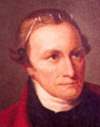
Gentlemen may cry, peace, peace—but there is no peace. The war is actually begun! The next gale that sweeps from the north will bring to our ears the clash of resounding arms! Our brethren are already in the field! ... Is life so dear, or peace so sweet, as to be purchased at the price of chains, and slavery?1
Patrick Henry (1736-1799) had little formal education. He entered business at 15, failing both as a shopkeeper and as a farmer. But when he took up law he discovered his true calling—orator.
He was successful before rural Virginia juries. In a famous case known as Parson's Cause he declared that by vetoing the acts of the colonial legislature King George III was acting as a tyrant, and had thereby forfeited allegiance.
His remarks earned him a seat in the Virginia legislature at about the time the infamous Stamp Act of 1765 was being enacted. Henry introduced resolutions opposing the power of England to tax the American colonies. Some of his fellow legislators accused him of treason. His response: "If this be treason, make the most of it."2
In 1774, Henry was Virginia's delegate to the First Continental Congress. Upon his return to Virginia he was eloquent in his belief, still in the minority, that the colonies must take up arms against Great Britain.
Virginia's Revolutionary Convention was convened March 23, 1775, in St. John's Church of Richmond. When Henry was called upon to speak he began by praising the integrity of those who disagreed with him. But, he added, he would be guilty of treason if, with a question of such "awful moment" before the country, he should fail to speak plainly from fear of giving offense.
The time to act was now. "[W]e have done every thing that could be done to avert the storm which is now coming on. ... Our petitions have been slighted; our remonstrances have produced additional violence and insult; our supplications have been disregarded; and we have been spurned, with contempt, from the foot of the throne."3
Patrick Henry was something of a ham actor. As he spoke, his voice grew impassioned; the tendons of his neck stood out white and rigid. If his countrymen would be free, they must fight, he declared. He crossed his wrists, as though manacled. "Is life so dear, or peace so sweet, as to be purchased at the price of chains and slavery? Forbid it, Almighty God!"1
He glared at those who opposed him—"I know not what course others may take;"— raised his right hand in a fist, as if holding a dagger—"but as for me, give me liberty"—plunged the fist to his heart—"or give me death!"
The words were met with a dead silence. Then a spectator shouted out: "Let me be buried at this spot!"4 Patrick Henry had made his point.
Henry went on to become the first post-colonial governor of Virginia, serving from 1776 to 1779, and again from 1784 to 1786.
He would oppose ratification of the Constitution as an affront to "the spirit of republicanism."5 Even the preamble bothered him: "[W]ho authorized them to speak the language of, we, the people"6? he asked. "If the states be not the agents of this compact, it must be one great consolidated national government"6. Constitutional checks and balances were "specious" safeguards, he said; mere "contrivances."
As historian John A. Garraty puts it, "Henry's negativism had a positive result."7 After the Constitution was ratified, forceful advocacy by Henry and other Antifederalists quickly led to the adoption of a Bill of Rights.
Patrick Henry died of cancer at his plantation home of Red Hill on June 6, 1799.
Copyright © 2000, The Daily Objectivist - Reprinted with permission of The Daily Objectivist and Davidmbrown.com.
16 Jan 2009 (last edit: 9 Jan 2024)
You can assist the work of Freedom Circle by purchasing one of the works discussed above:
-
William Wirt, Sketches of the Life and Character of Patrick Henry, Philadelphia: James Webster, 1817, p. 123. See also William Wirt Henry, Patrick Henry: Life, Correspondence and Speeches, Volume I, New York: Charles Scribner's Sons, 1891, p. 266. (Freedom Circle note) ↩︎
-
Wirt, Sketches, p. 65. Also Henry, Patrick Henry, p. 86. (Freedom Circle note) ↩︎
-
Wirt, Sketches, pp. 121-122. Also Henry, Patrick Henry, pp. 263-264. (Freedom Circle note) ↩︎
-
Henry, Patrick Henry, p. 270. (Freedom Circle note) ↩︎
-
Wirt, Sketches, p. 277. (Freedom Circle note) ↩︎
-
Wirt, Sketches, p. 267. See also Henry, Patrick Henry, Volume II, p. 348. (Freedom Circle note) ↩︎
-
John A. Garraty, "Henry, Patrick", in The Reader's Companion to American History, Eric Foner and John A. Garraty (editors), Boston: Houghton Mifflin Company, 1991, p. 498. (Freedom Circle note) ↩︎
